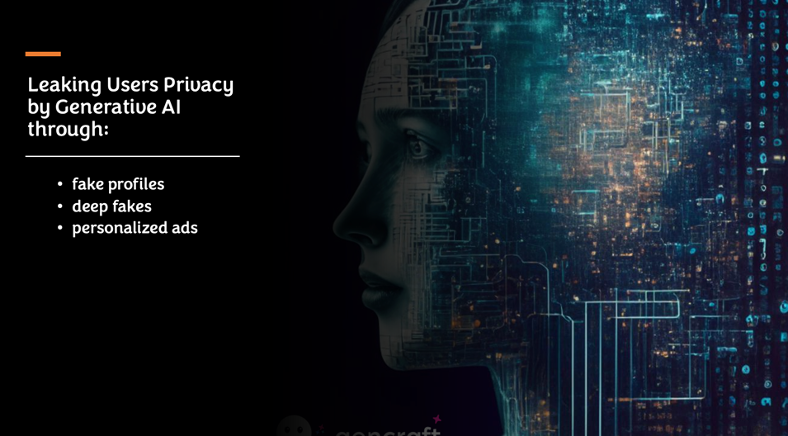Impact of Generative AI on Users' Privacy in Online Social Networks
Introduction
In recent years, generative AI, a technology that uses training algorithms on massive datasets to produce new data that closely matches the original, has gained popularity. The creation of fake content, however, that can be used to propagate misinformation and manipulate public opinion, has also been done using this technology. Given that this technology can be used to produce fake profiles, deep fakes, and personalized ads, the effect of generative AI on privacy in online social media has come under increasing scrutiny. In this post, we'll look at how generative AI affects online social media privacy, the problems it presents, and potential fixes.

Online social media privacy and generative AI
Because it enables users to produce new content that appears authentic and natural, the use of generative AI in social media has grown increasingly popular. However, this technology can also be used to fabricate content, such as false posts, comments, and profiles, which can be exploited to shift public opinion and steal private data. A generative AI model that can be used to produce fresh material that appears to have been authored by a human user can produce fake content by being trained on a big dataset of social media posts.
Online social media platforms are becoming increasingly concerned about the production of fraudulent material using generative AI. Fake content produced by generative AI can be used to affect public opinion and even shape political discourse in light of the emergence of fake news and disinformation. In the same way that hackers can use false profiles to deceive users into disclosing their personal information, false content can also be used to steal personal information.
Deepfakes are another way that generative AI is affecting online social media privacy. By switching appearances, voices, or even entire bodies, deepfakes are a sort of generative AI that may be used to produce convincing fake films and photos. Deepfakes can be used to fabricate films of public persons saying or doing things they never would have done in order to produce revenge porn, blackmail, or even to influence political debate. Given how difficult it may be to identify deepfakes and tell them apart from real information, the use of generative AI to create deepfakes can be a serious danger to privacy in online social media.
Through the creation of personalized ads, generative AI is also affecting how people use their privacy on social media. Generic artificial intelligence (generative AI) can be used to produce ads that are specifically targeted to each user by examining user data, such as their behavior, preferences, and demographics. Although users who are interested in a specific product or service may find personalized ads helpful, they can also be used to track user behavior and gather personal data without the users' knowledge or consent.
Challenges and Solutions
Many problems regarding generative AI's effects on online social media privacy must be resolved. The capability to recognize false content produced with generative AI is one of the major difficulties. It becomes more difficult to identify phony content from real content as the technology used to produce it advances. However, by examining the patterns and anomalies in the data, researchers are creating algorithms that can identify fake content produced using generative AI.
Regulating the usage of generative AI in online social media is another difficulty. Concern over the use of generative AI in influencing public opinion is developing in response to the rise of fake news and misinformation. Regulating the usage of generative AI, however, can be difficult because it is hard to manage how this technology is employed. Creating and enforcing ethical standards for the usage of generative AI in social media is one potential answer.
The capacity to safeguard user privacy in tailored adverts presents another difficulty. Although users may find personalized ads useful, they can also be used to gather personal data without users' knowledge or consent. Creating privacy-preserving data analysis tools that enable generative AI systems to examine user data without disclosing personally identifying information is one potential remedy. This can maintain the ability to create tailored adverts while also assisting in user privacy protection.
Along with these difficulties, there are worries about how generative AI might be used improperly in online social media. With the development of this technology, it has become simpler to produce fake content that can pass for the real thing. This has serious ramifications for democracy and society at large since it may be used to spread misinformation and sway public opinion.
It's crucial to create strong regulatory frameworks that can help reduce the risks related to generative AI in online social media in order to alleviate these worries. This can entail creating moral standards for using this technology, putting rigorous data privacy regulations in place, and spending money on R&D to make it easier to spot fraudulent information.
Conclusion
Generative AI is a powerful technology that can be used to create untrue content that can be used to spread misinformation, sway public opinion, and steal personal data. It is important to create strong regulatory frameworks to reduce the risks related to generative AI in online social media, such as creating moral standards for using this technology, putting rigorous data privacy regulations in place, and spending money on R&D to make it easier to spot fraudulent information. Researchers, decision-makers, and business leaders should work together to ensure that generative AI is utilized ethically and responsibly in online social media, protecting user privacy and preserving democracy and society.
This blogpost was written by Ahmad Hassanpour. As an AI engineer, he worked on various projects such as face recognition system, object detector, fire detector, intelligent EEG and ECG signal analyzer, video classifier, etc.

